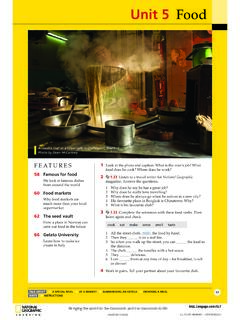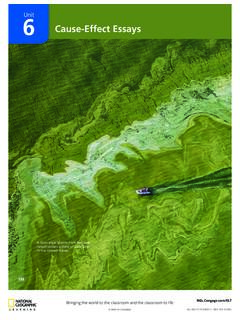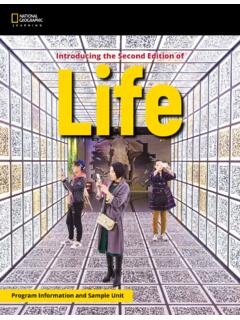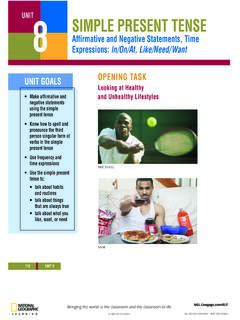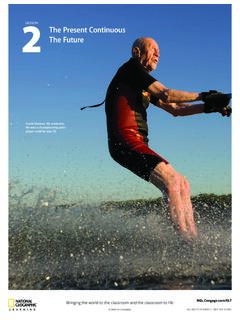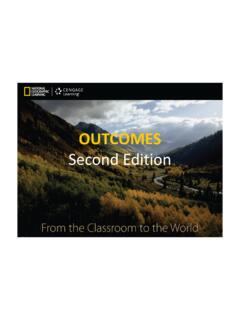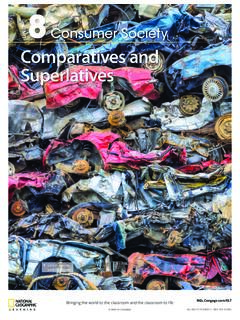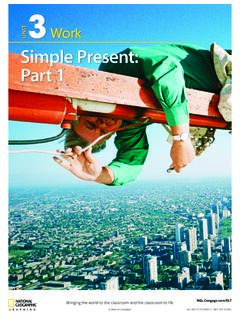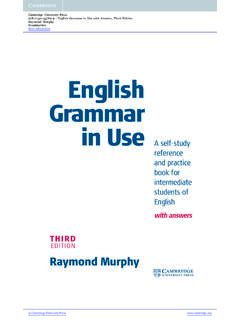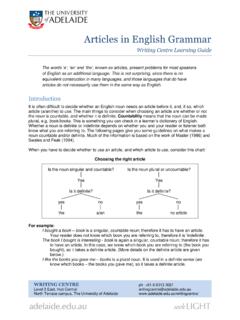Transcription of Unit 5 The environment - eltngl.com
1 Bringing the world to the classroom and the classroom to lifeA PART OF RIGHTS RESERVED NOT FOR RESALEUnit 5 The environmentFEATURES58 RecyclingThe real story behind recycling our trash60 Managing the environmentSome environmental stories from around the world62 A boat made of bottlesHow one environmentalist is trying to raise awareness66 Recycling CairoA video about how recycled objects are used in Cairo, Egypt1 Work in pairs. Look at the photo and the caption. What do you think of the home in the photo? Would you like to stay there?
2 Which of these materials did Jaime use?cardboard glass leather metal paper plastic wood2 35 Work in pairs. Listen to part of a documentary about Jaime and the house in the photo. Answer the questions. 1 What materials does the speaker mention?2 What did Jaime do with them? Give an What does Jaime want people to think about? 3 Work in pairs. Look at the highlighted expressions for talking about objects. Form similar sentences about the everyday objects in the box dictionary is made of paper.
3 You use it for looking up words. an envelope a cell phone a wallet a tin can4 Think of another everyday object. Don t tell your partner what it is, but describe what it s made of and what you use it for. Your partner has to guess the artist Jaime built this home in Florianapolis, Brazil, from recycled Recycling7 Look at the sentences in the grammar box. Then complete these sentences with the correct quantifiers in bold in the grammar box. 1 We use some and a lot of in affirmative statements with countable or uncountable We use in questions and in negative statements with countable or uncountable We use to talk about small quantities in affirmative statements with countable We use to talk about small quantities in affirmative statements with uncountable We use in negative statements and in questions with countable We use in negative statements and in questions with uncountable Circle the correct quantifiers to complete the How much /
4 Many trash do you recycle? 2 I recycle a few / a little things, like glass and plastic I don t recycle many / much I recycle a few / a little paper each Do you have much / any recycling bins?6 There are some / any old TVs for sale. 7 You shouldn t throw away many / any paper! 8 How many / much times can paper be recycled?9 Nowadays, a lot of / a little cities and towns have special recycling my 9 Work in pairs. Discuss these sentences (1 4) about recycling. Are they true for you? If necessary, change the words in bold so the sentences are true for I throw away a lot of paper every In my area, a few places have recycling My school / place of work doesn t have any recycling bins for Some people in my country think recycling is : How much paper do you throw away every week?
5 B: I don t throw away any paper. We recycle it in special green bins. Grammar quantifiers6 Which of these nouns are countable (C)? Which are uncountable (U)? Write C or U. trash computer plastic bag box magazine paper metal QUANTIFIERSWe use quantifiers with countable and uncountable nouns to talk about quantity. Do you ever throw away any electronic waste?Perhaps you have some old technology that doesn t found a lot of e-waste in sellers resell a few can t sell many computers in the parts don t have much is a little gold shouldn t send any e-waste to other more information and practice, see page 164.
6 Reading 3 Work in pairs. Look at the photos with the article. What do you think e-waste is? Why is the boy holding part of an old computer?4 Read the article and check your ideas from Exercise Work in pairs. Read the article again and answer these What did Peter Essick find in the markets of Ghana?2 Why do people melt parts of the broken computers?3 Why is recycling the metal dangerous?4 What types of electronic products are environmentally friendly? Vocabulary recycling1 Work in pairs. What kind of trash do you throw away or recycle every week?
7 What percentage of each type (a e) is in your trash can?About 25% of my trash is paper. a electronics d metalb glass e plasticc paper and cardboard2 Match these objects (1 8) to the type of trash (a e) in Exercise 1. Some items match two computer 2 bottle 3 jar 4 aluminum foil 5 TV 6 cereal box 7 magazine 8 bag Do you ever throw away any electronic waste (or e-waste)? Perhaps you have some old technology that doesn t work, like an out-of-date phone or a slow computer. But when you throw away these objects, do you know where they go?
8 The reporter Peter Essick has followed this e-waste to different countries around the world. Essick found a lot of e-waste in Ghana, with thousands of old computers in the local markets. Here, the sellers resell a few computers, but they can t sell many because a lot of them don t work. Instead, the sellers melt1 some parts of the computers to recycle the metal. These parts don t have much metal, but sometimes there is a little gold inside. Unfortunately, recycling the metal can be dangerous because it produces a lot of chemicals that are bad for workers health.
9 As a result, Essick thinks we shouldn t send any e-waste to other countries. It s bad for the environment , and it s bad for people s health. He believes we need to produce more environmentally-friendly electronics in the future; in other words, electronic products that you can recycle safely and in the country where they were made or 1 melt (v) /melt/ to heat an object until it turns to liquidb, eaUCElectronic waste in Agbogbloshie dump, Accra, Ghana5958 Unit 5 The environment5b Managing the environment4 Work in pairs. Answer these questions about your life using over, under, almost, and How much of your day do you spend looking at a screen ( , computer, TV)?
10 I spend about a third of my day looking at a How many hours a week do you spend shopping?3 How many people live in your town or city?4 How much money do you spend on buying clothes each month?5 How many months a year do you spend at school or at work?Listening5 37 Work in pairs. Listen to a news report about two environmental projects and answer the What four deserts does the report mention? 2 Where are the two environmental projects?3 What type of wall are the countries building?6 37 Work in pairs. Listen again and answer the questions.
